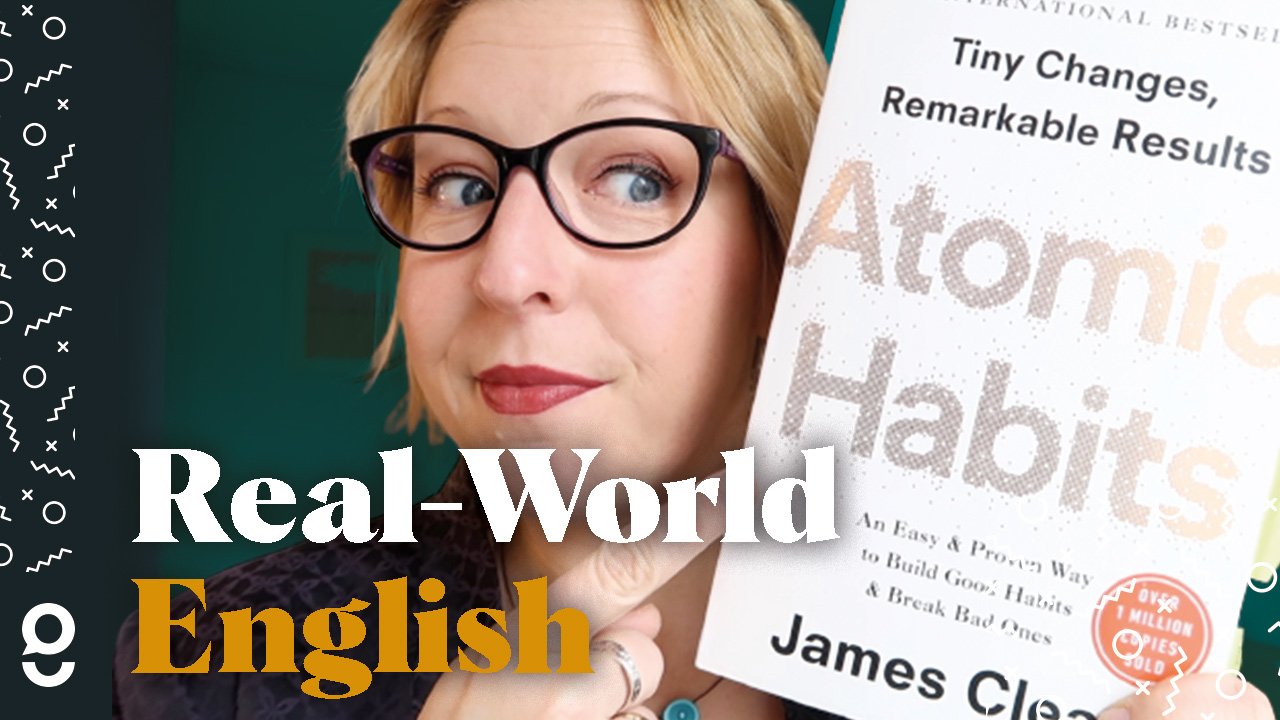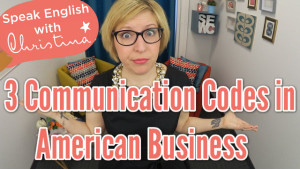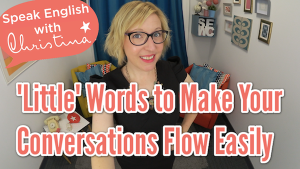
Improving your English by watching real-life videos is exciting–but difficult to do alone.
Having just a little help can make a big difference in what you understand and learn when you watch real-life videos in English.
Today, you’ll learn interesting new expressions and understand the big ideas from a great video in English that you can find on YouTube.
It’s by one of my favorite authors on habits and motivation, James Clear.
You might be interested in James Clear if you’re interested in reaching your business goals, or improving in any area in your life where you need good habits to succeed…like English!
His big idea in the video we’re going to talk about is:
“If you can change your habits, you can change your life.”
This is such a great topic that I decided to do two videos about it. So today we’ll talk about two of James Clear’s big ideas.
And next week, I’ll be back with another video with 2 more big ideas that I’m sure you’ll love.
Let’s check it out together!
Get the worksheet to test what you learn in this lesson!
Did you know that I’ve made a worksheet to go with this lesson so that you can practice everything you see here today? I want you to make this part of the English you actually use in real life!
GET THE WORKSHEET: Make sure you practice these expressions so you can use them in real life with this worksheet made for you by a Neurolanguage coach.
Index:
1. Big Idea #1: tiny new habits change your life
2. Big Idea #2: You don’t lack motivation, you lack clarity
1. Big Idea #1: tiny new habits change your life
Early in the video, Clear talks about what would happen…
“If you were able to improve by 1% each day…”
That means, that, in some area of your life, you make a tiny change.
Maybe you would learn some new expressions that make you 1% better in English.
But then you’d do it each day…for a year!
He also talks about those small changes ‘adding up’ as we would say in English.
He says:
“If those gains compound you would end up 37 times better at the end of the year”
If you work in finance…or just have a bank account with interest, you probably know about compounding gains–earning interest on your interest.
It means that when you start now and keep going, the change is much bigger than you might expect.
Notice how he also says the same thing in everyday English:
“Small habits and little choices are transforming us every day already…”
Also check out my lesson: Feeling blocked in English is the #1 problem of adult learners. Here’s the solution.
Big Idea #2: You don’t lack motivation, you lack clarity.
On the topic of motivation, Clear says that…
“Many people think they lack motivation when what they really lack is clarity.”
In this case, if you lack motivation–it means you don’t have enough motivation.
But what does it mean to lack clarity?
To not have a good mental image or a good understanding of your real problem.
One of the big problems Clear points out in the video is when you don’t have a plan for starting your new habit.
This simply means you haven’t decided or written down how you will achieve your goal.
He also explains how you can have a plan when he says,
“You can take the decision-making out of it” by explicitly stating when, where, and how you will implement the habit.”
Here, to take the decision-making out of something means you remove the need to make any choices about your new habit.
When you don’t have to choose, it’s easier to act!
Explicitly stating something means saying or writing exactly what you mean–so there is no confusion.
To implement a habit simply means to start your new habit.
You could also say to implement a plan–to take an idea and put it into action.
Is there a habit you’d like to implement that could change your life?
WATCH THE ORIGINAL VIDEO: Click here to watch the video by James Clear that inspired this lesson.
GET THE WORKSHEET: Make sure you practice these expressions so you can use them in real life with this worksheet made for you by a Neurolanguage coach.
Take the next step: Improve your English in the comments
The best way to become more confident using Business English is to practice!
Here’s your Confidence Challenge for this week:
- Tell me about a habit you’d like to start in the comments.
- And write down exactly what you’ll do to begin that new habit.
If you learned something from this lesson, please share it with your coworkers & friends. You can send your message to them in English for more practice!
Click here to share this article on LinkedIn
Click here to share this article on Facebook
Become more fluent & comfortable in conversations
If you would like to take the next step with me, discover my Faster Fluency Conversation Club Membership Program!
It helps you become more confident speaking in conversations, and get a lot more vocabulary on many different topics! And it’s a fabulous community of “English buddies” from around the world!
TIP: Use the code FFCC40 to save -40% off your 1st month of membership!
More details at
https://mybusinessenglishcourses.com/faster-fluency-conversation-club/join-now
Can’t wait to see you in the Club,
Christina
More good stuff…
Click the image to learn more








Hi Christina
What you are doing is fascinating.We need to change
I joinedFFCC in April 2020 and got quickly fluency.I reached a good plateau and 6 months later I decided to change something in order to use a native language.I made up a”Phrasal Verbs comfort zone”=I can use more than 200 of them and I enjoy using them . Right now I’m making up a comfort zone selecting more than 100 “native expressions”tough to use with my partners of FFCC (I can use them when I speak to Kristina in private lesson.
Examples:Instead of saying difficult I say tough, how long have you been in the field for worked in that profession,He doesn’t have the skill set for the job for not qualified,this document is time sensitive for must be signed right away, did I get my point across for understand and so on.
When I notice some of them in different movies I’m happy.
Trying to speak like a native is an fascinating challenge